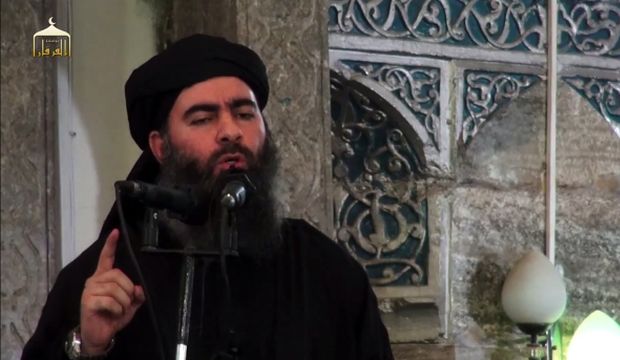
An image from a propaganda video by Al-Furqan Media allegedly shows the leader of the ISIS Abu Bakr Al-Baghdadi on July 5, 2014 (AFP PHOTO / HO / AL-FURQAN MEDIA)
Khaled Al-Obaidi said on his official Facebook page he had received information “confirming that Abu Bakr Al-Baghdadi had been injured and his deputy and right-hand-man, Abu Muslim Al-Turkmani, killed in an airstrike which targeted the location of a meeting in Mosul involving some of the group’s most senior members . . . May God not allow him [Baghdadi] to recover and quicken his demise.”
There have also been unofficial reports that Baghdadi was killed in the attack, but these remain unconfirmed. Speaking to French news agency AFP, a member of the Iraqi intelligence apparatus said there were as yet no precise details regarding Baghdadi’s state of health following the raid.
A spokesman at the US military’s Central Command said it had no information to corroborate media reports that Baghdadi was wounded in any strike over the weekend.
Said Mamouzini, the spokesman for the Kurdistan Democratic Party (KDP) in Iraq’s northwestern Nineveh province—whose capital is Mosul—told Asharq Al-Awsat Baghdadi was not part of the convoy hit in the raid on Friday night because he had suffered a major head wound some 20 days ago following other coalition airstrikes targeting the Kamdi area just north of Mosul.
Following his injury, which Mamouzini said was “major,” the ISIS leader was first taken to Syria and then to another unknown country.
“According to the information we have received from inside Mosul, during his stay in the city Baghdadi would drive his car by himself or use only one driver—so that he remained unrecognized. He also shaved off his beard.”
Meanwhile, speaking to Asharq Al-Awsat, Faris Ibrahim, a member of an anti-ISIS coalition of tribesmen from the northwestern Anbar province, seemed to confirm eyewitness reports, carried by news agency Reuters, that another airstrike had hit ISIS positions—killing a number of the group’s senior members in the process—near the town of Al-Qa’im, close to the Syrian border.
“Confirmed reports we have received say that a US airstrike targeted a number of senior ISIS figures in Al-Qa’im, killing them, and destroying dozens of [items of] their military equipment and armored vehicles,” Ibrahim said.
He added that his group did not have any confirmed reports regarding Baghdadi or the state of his health, though he said—echoing Mamouzini’s comments regarding the ISIS leader’s whereabouts—that the Anbar coalition had received information that Baghdadi had been taken to Syria following a recent airstrike in Al-Qa’im.
He added: “A man was brought to Al-Qa’im Hospital, but no-one was allowed to see him and he was completely covered up. Staff were only told he was ‘a very important person.’ [After treatment] he was then taken to Syria, which makes us believe this man was Baghdadi himself.”
Meanwhile, Iraqi President Fuad Masoum will visit Riyadh on Tuesday to meet with the Custodian of the Two Holy Mosques, Saudi Arabia’s King Abdullah Bin Abdulaziz.
Diplomatic sources in Riyadh—who requested anonymity because they were not authorized to brief the media—told Asharq Al-Awsat that during the visit Masoum will be accompanied by high-ranking Iraqi political figures, and that his talks with King Abdullah would encompass the current security situation in Iraq and the region, and the fight against ISIS, especially considering that Saudi Arabia is part of the international anti-ISIS coalition.
Following the visit to Riyadh, Masoum will head back to Iraq, also on Tuesday, where he will meet with Grand Ayatollah Ali Sistani, the most senior Shi’ite religious cleric in the country.
An official Iraqi source, who requested anonymity because he was not authorized to brief the media, told Asharq Al-Awsat the timing of the two visits, coming quickly one after the other, was “purely coincidental.”
“The official invite from the Kingdom was received at the same time that . . . [Sistani] agreed to receive the president in Najaf, after deciding not to meet with any politicians during the last four years,” the source said.
Haider Al-Ghorabi, a close aide of Sistani’s, told Asharq Al-Awsat the Shi’ite cleric had not met with politicians during the last four years, including former prime minister Nuri Al-Maliki, not due to “personal reasons,” but on the basis of “performance and the safeguarding of the interests of the country,” which Ghorabi said had been absent during Maliki’s premiership.
Masoum’s visit to the Kingdom comes amid efforts by the new administration in Baghdad, led by Prime Minister Haider Al-Abadi, to further cement relations with Iraq’s neighbors and regional allies during its present crisis.
During an exclusive interview with Asharq Al-Awsat in June, Masoum said he was keen to rebuild Iraq’s relationship with its Gulf allies, and in particular with Saudi Arabia, after a period of a relative discord under former premier Maliki.
Speaking to Asharq Al-Awsat, Dr. Amed Hassan Fayadh, dean of the School of Political Science at Nahrain University in Baghdad, said in light of the threat ISIS posed to Iraq, the country needed not only to unite internal political factions, but also to reach out to other countries in the region.
“The danger of terrorism requires alliances because the danger is no longer just an internal one [to Iraq], it is now a trans-border one,” he said. “The fight [against ISIS] must be an international one, and this therefore mandates our seeking both regional and international allies.”
Hamza Mustafa contributed reporting from Baghdad.

Trackbacks/Pingbacks